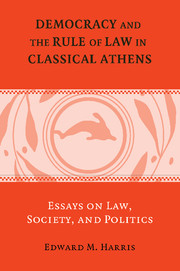Book contents
- Frontmatter
- Contents
- PREFACE
- ACKNOWLEDGMENTS
- ABBREVIATIONS
- INTRODUCTION
- I LAW AND CONSTITUTIONAL HISTORY
- II LAW AND ECONOMY
- III LAW AND THE FAMILY
- IV ASPECTS OF PROCEDURE
- 1 “In the Act” or “Red-Handed”? Apagoge to the Eleven and Furtum Manifestum
- 2 How to Kill in Attic Greek: The Semantics of the Verb (ἀπο)κτείνειν and Their Implications for Athenian Homicide Law
- 3 The Penalty for Frivolous Prosecution in Athenian Law
- V ENVOI
- BIBLIOGRAPHY
- INDEX LOCORUM
- SUBJECT INDEX
1 - “In the Act” or “Red-Handed”? Apagoge to the Eleven and Furtum Manifestum
Published online by Cambridge University Press: 25 February 2010
- Frontmatter
- Contents
- PREFACE
- ACKNOWLEDGMENTS
- ABBREVIATIONS
- INTRODUCTION
- I LAW AND CONSTITUTIONAL HISTORY
- II LAW AND ECONOMY
- III LAW AND THE FAMILY
- IV ASPECTS OF PROCEDURE
- 1 “In the Act” or “Red-Handed”? Apagoge to the Eleven and Furtum Manifestum
- 2 How to Kill in Attic Greek: The Semantics of the Verb (ἀπο)κτείνειν and Their Implications for Athenian Homicide Law
- 3 The Penalty for Frivolous Prosecution in Athenian Law
- V ENVOI
- BIBLIOGRAPHY
- INDEX LOCORUM
- SUBJECT INDEX
Summary
when dealing with certain types of common criminals, the laws of athens meted out harsh punishments. One of the most expeditious procedures for punishing criminals was called apagoge (“leading away” or arrest) to the Eleven, a board of magistrates selected by lot each year to run the prison in Athens. The Constitution of the Athenians (52.1) describes the procedure: “the Eleven punish with death those who are arrested as thieves (kleptas), enslavers (andrapodistas) and robbers (lopodutas) if they confess, while if they dispute the charge, they bring them before the court. If they are acquitted, the Eleven release them, and, if not, execute them.” The arrest could be made by any Athenian provided one essential condition was met: the offender had to be taken ἐπ ̉αὐτοφώρῳ. For instance, when Dionysius, a private citizen, employed the apagoge procedure to arrest Agoratus, the Eleven insisted that Dionysius add the words ep'autophoro on the indictment presented to them (Lys. 13.85–7). In a speech of Isaeus (4.28), we are told Chariades was arrested as a thief ep'autophoro and thrown into prison. According to the speaker, the Eleven, who should have put him to death, were derelict in their duty and released him. For this failure to inflict the standard punishment, all the Eleven were executed that year. The story may be courtroom slander, but it nevertheless shows that the thief had to be taken ep'autophoro for the Eleven to execute him. Apollodorus ([Dem.] 45.81) alludes to the procedure when accusing Phormion of embezzling money from his father's bank.
- Type
- Chapter
- Information
- Democracy and the Rule of Law in Classical AthensEssays on Law, Society, and Politics, pp. 373 - 390Publisher: Cambridge University PressPrint publication year: 2006
- 2
- Cited by



